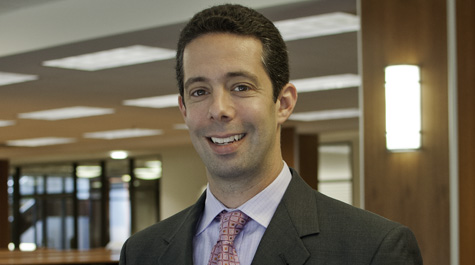Supreme Court Cites Gershowitz in Ruling Rejecting Warrantless Cell Phone Searches
The Supreme Court ruled this week in Riley v. California and United States v. Wurie that police may not conduct warrantless cell phone searches following an arrest. In the Court’s unanimous opinion, Chief Justice John Roberts twice cited an amicus brief authored by William & Mary Law School Professor Adam M. Gershowitz.
Professor Gershowitz wrote the amicus brief [opens .pdf] on behalf of 28 criminal law professors from around the country in support of Petitioner Riley and Respondent Wurie. The brief argued that police should not be permitted to search a cell phone incident to arrest without a warrant. Instead, the brief maintained that officers should be authorized to seize the phone and immobilize it in an aluminum-lined container known as a faraday bag. The amicus brief documented numerous instances of police departments already using faraday bags to preserve data on cell phones.
The Supreme Court cited Professor Gershowitz’s amicus brief for the workability of faraday bags and their use by law enforcement. The Court noted that faraday bags are “cheap, light-weight, and easy to use.” It also called the faraday bag solution a “reasonable response” for police to use to preserve evidence while waiting for a search warrant.
William & Mary's Appellate and Supreme Court Clinic filed the amicus brief and provided editorial support. Professor Gershowitz noted that he “was very fortunate to receive helpful editing and assistance from Tillman Breckenridge, the director of the Clinic and appellate specialist who regularly briefs cases in federal courts around the country.”
In addition to being cited by the Supreme Court, the amicus brief attracted considerable press attention. The brief was discussed in a New York Times article about warrantless cell phone searches, Supreme Court Taking Up Police Searches of Data Troves Known as Cell Phones. It was also profiled in U.S. Law Week in a March 18 post titled "Call It the 'MacGyver' Fix: Aluminum Foil May Solve Cell Phone Search Dilemma."
Gershowitz has written multiple articles on the legality of warrantless searches of cell phones. He recently published an article on the issue in the William & Mary Bill of Rights Journal titled "Seizing a Cell Phone Incident to Arrest: Data Extraction Devices, Faraday Bags, or Aluminum Foil as a Solution to the Warrantless Cell Phone Search Problem" (SSRN). The Wall Street Journal's LawBlog referenced the article in an August 2013 post titled "What Seized Cell Phones and Leftovers Have in Common."
About William & Mary Law School
Thomas Jefferson founded William & Mary Law School in 1779 to train leaders for the new nation. Now in its third century, America's oldest law school continues its historic mission of educating citizen lawyers who are prepared both to lead and to serve.
